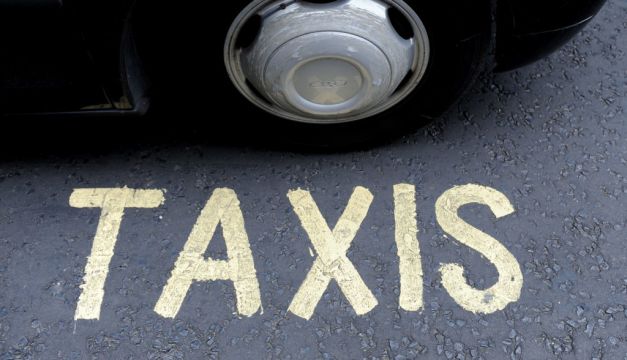A record number of complaints about taxi drivers last year has been linked to the introduction of a new regulation requiring licence holders to accept cashless payments for fares.
New figures published by the National Transport Authority, which acts as the regulator for the taxi industry, show it received a total of 1,625 complaints in 2022.
It represented almost a threefold increase on the number of complaints received in 2021, while it was also a 17 per cent increase over the previous record annual total of 1,383 in 2019.
The NTA said the growth in the number of complaints was “mainly due to the introduction of a new requirement in September 2022 for taxi drivers to provide cashless payment terminals for fares.”
It claimed the regulation had resulted in the complaint category of “overcharging and other matters relating to fares” accounting for almost half of all complaints made last year – a total of 793 cases.
The second most common category of complaint related to the conduct and identification of drivers which accounted for 481 complaints or 30 per cent of the total.
The number of complaints about the condition and roadworthiness of taxis was down almost 50 per cent on pre-pandemic levels to 42.
The NTA said 40 per cent of complaints resulted in the driver being issued with a fine, warning, advice or a summons for prosecution.
It also reported that over 204,000 checks were carried out on taxis and other small public service vehicles (SPSVs) as well as drivers last year which involved approximately 90 per cent of all vehicles.
They resulted in 655 drivers being issued with on-the-spot fines.
The most common offence was the failure to notify details of the vehicle being operated to the NTA which accounted for 21 per cent of the total.
Other common breaches of taxi regulations related to vehicle standards, the unreasonable refusal to carry a passenger and the failure to print or offer a taxi receipt.
The NTA said it initiated 146 prosecutions against taxi drivers last year with a majority of cases relating to the operation of an unlicensed vehicle.
Meanwhile, the number of taxi drivers in Ireland has decreased by almost 7 per cent to just under 25,400 since the start of the Covid-19 pandemic.
The latest figures show there were 1,835 fewer drivers of taxis and other small public service vehicles (SPSVs) at the end of 2022 compared to March 2020.
A total of 25,393 active SPSV licences were recorded last year – a decrease of 6.7 per cent since the outbreak of the pandemic – with almost 60 per cent of drivers licensed to operate a taxi service.
It means there are now over 22,000 fewer taxi drivers in Ireland since the peak level of 47,529 recorded in May 2009.
A general downward trend in the number of people working in the taxi industry was reversed between 2017 and early 2020 as a result of a recruitment campaign by the NTA before it was adversely affected by the impact of the pandemic.
According to the NTA, a total of 1,159 new SPSV driver licences were issued last year – more than double the number of new driver licences issued in 2021 – with almost two-thirds of the new entrants licensed to operate in Dublin.
However, the numbers leaving the industry were even higher with 25 individuals surrendering their licence, while another 1,400 allowed their licence to lapse permanently during 2022.
The latest figures also confirm the ageing profile of taxi drivers with a majority aged 50 and over.
Only 660 drivers – just 2.6 per cent of the total – are aged under 32 years, while over 14 per cent of all drivers are aged over 68 years.
“The figures indicate that a career in taxi driving may be popular as a second career, post-retirement,” the NTA said.
The regulator said a majority of applicants who sit and fail the driver entry test for taxis and other SPSVs do not take the test a second time.
However, NTA figures show applicants take on average 2.8 tests before they pass the exam.
More than 2,460 candidates took the test last year.
Despite the decline in the number of people working in the taxi industry, the size of the national fleet grew by almost 2 per cent last year.
NTA figures show the total number of active licence plates rose by 1.8 per cent to 19,281 vehicles including 16,220 taxis– an annual increase of 335.
However, the national fleet remains over 2,000 vehicles below pre-pandemic levels.
At the same time, the number of wheelchair accessible taxis reached a record level of 3,206 last year.
All new taxi vehicles since June 2010 must be capable of carrying passengers who use wheelchairs, while grants of up to €7,500 have been available for the purchase of wheelchair accessible vehicles.
A total of €1.32 million was made available in grants in 2022 which facilitated the addition of 231 new taxis and 81 replacement vehicles.
The NTA said the percentage of wheelchair accessible vehicles in the Irish fleet at over 17 per cent compared very favourably to other similarly regulated countries.
The regulator also reported a 75 per cent increase in applications to the grant scheme for electric SPSVs last year.
However, the NTA said only 636 applicants received funding worth €11.9m as the remainder were unable to source a vehicle before the end of the year due to international supply chain constraints.
“Climate, energy and geopolitical challenges resulted in long delays for new vehicles in Ireland as well as inflated prices for second-hand vehicles, making it unfeasible for some to enter the fleet,” the NTA stated.
Nevertheless, the number of fully electric vehicles in the national taxi fleet more than doubled in the space of 12 months.
The latest figures show there were 1,369 e-cars in the fleet at the end of 2022 compared to 674 the previous year, while there are also a further 3,539 hybrid vehicles.







